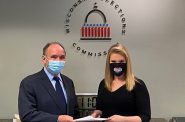State Licenses Hurt Entrepreneurs
Too many occupational licenses required, creating barriers to startup businesses.
Many elements make up a thriving entrepreneurial economy. Among them are cultures that reward risk and don’t penalize honest failure; workers who are diverse in terms of skills and training; clusters of innovation in cities or universities; and access to capital.
Just as high on the list is a regulatory climate that encourages the free flow of talent and that lowers barriers to entry into the startup economy.
A proposal by Gov. Scott Walker to create commissions to scrutinize proposed and existing occupational licenses is a welcome step toward lowering those hurdles for thousands of workers in Wisconsin. It deserves bipartisan support in the Wisconsin Legislature.
The institute estimated the steady rise in occupational regulation costs Wisconsin thousands of jobs each year and costs consumers hundreds of millions of dollars due to reduced competition for goods and services.
National organizations have a similar take on the hidden costs of fencing out new entrants to the job market.
The Ewing Marion Kauffman Foundation in Kansas City, Missouri, has long cited over-regulation of occupations – mainly by state and local governments – as a deterrent to entrepreneurism. Numerous academic studies have reached the same conclusion as Kauffman, which has said the proliferation of occupational licensing “creates barriers for would-be entrepreneurs and strengthens incumbent businesses.”
“These barriers often go unnoticed until the entrepreneur runs up against them,” noted one Kauffman report.
The President’s Council on Economic Advisors issued a report in 2015 urging states to adjust their licensing policies to spur growth. Liberal think-tanks such as the Progressive Policy Institute have also called for occupational license reform, noting “there is mounting evidence that professional and occupational licensing is blocking innovation and entrepreneurship across large swathes of the American economy.”
The U.S. Treasury and Defense departments have issued a joint report noting the negative effects of occupational licensing on the job prospects of military families, who often move from state to state and encounter different barriers in each.
If so many experts agree over-regulation is costing the economy and making it harder for entrepreneurs to start businesses, why are so many licensure requirements in place?
In most instances, however, it’s the professions themselves that ask for regulation. That’s in part due to a sense of internal credibility, but it’s also due to an unspoken desire to limit competition by fencing out new players.
There are alternatives to full licensure, which is the most limiting form of occupational regulation. Certification has fewer restrictions than licensing, allowing any person to perform the service but recognizing those who have attained a certain level of experience or education. The least restrictive form of occupational regulation is registration, which simply requires professionals in a field to record their qualifications with the state or another regulatory body.
Wisconsin is not alone in trying to rein in licensing creep. Ten states have formal “sunrise” and “sunset” commissions to take a hard look at new and existing worker licenses. States such as Colorado, Arizona, Vermont, Washington and Georgia have recommended against licensing interior designers, art therapists, music therapists, dietitians, landscape architects, massage therapists and behavior analysts – occupations all licensed or regulated in Wisconsin, according to the Institute for Law and Liberty.
Wisconsin’s below-average startup numbers may be dragged down by a number of factors, and excessive licensing is one of them. The state should seize on the opportunity to begin tearing down unnecessary fences to entrepreneurism.
Tom Still is president of the Wisconsin Technology Council.
This column was originally published by the Wisconsin State Journal.
Op-Ed
-
Why Vote for MPS Funding Referendum
 Mar 30th, 2024 by Nehemiah Edwards
Mar 30th, 2024 by Nehemiah Edwards
-
Wisconsin’s Very Own Rudy Giuliani Should Not Oversee Judicial Ethics
 Mar 25th, 2024 by Richard Niess
Mar 25th, 2024 by Richard Niess
-
Voting at Wisconsin’s Universities Isn’t Easy
 Mar 17th, 2024 by Nicole Laudolff
Mar 17th, 2024 by Nicole Laudolff


















Is there really economic growth potential in “interior designers, art therapists, music therapists, dietitians, landscape architects, massage therapists and behavior analysts”? Even if you undo the licensing requirements for all of them, I’m very skeptical that there’s going to be a sudden rush of entrepreneurs in these professions.
Sure, I don’t think there’s much harm in doing away with or lessening the licensing requirements for most of those occupations, but I’d be surprised if the benefits are more than marginal.
@Robert….it’s just another angle on eliminating most…teaching in particular.
“The U.S. Treasury and Defense departments have issued a joint report noting the negative effects of occupational licensing on the job prospects of military families, who often move from state to state and encounter different barriers in each.”
Thinking about opening a states right can of worms are we?
If that’s the problem, then reciprocity agreements are the solution.
Again, nothing wrong with making sure that the licensing requirements are reasonable. But, really, I don’t see the requirement that a Landscape Architect hold a degree from an accredited college going away. Is passing a test and paying a fee really keeping qualified people, who have made it through college, out of the profession?
Now, perhaps for professions that don’t require a college education, there’s something of a barrier. This doesn’t strike me as a barrier for the really serious, though.
This sounds like another apple pie idea, but its from the right wing “legal” firm Wisconsin Institute for Law and Liberty so maybe it deserves a little deep look. They claimed in a op ed piece in the Journal Sentinel in 2016 that ending licensing would create 38,000 jobs — based on what, exactly? Voucher schools have not been required to hire licensed teachers, and Governor Walker just appointed a voucher school executive to head the agency that licenses all other professions but not teachers. Knowing that a professional is licensed is primarily supposed to be about protecting the public from harm — I want a licensed plumber or electrician in my house because how else am I supposed to know they have the training and expertise to do the job? The primary impact will actually be to reduce the income of the properly qualified expert, since anyone can advertise that they can do a particular job, and reduce the public’s ability to know who to hire.
On the states website you can view a list of licensed occupations / activities . Most do not appear to restrict anyone . Many are licenses held but ” inactive ” . So where is there growth potential or anyone being kept out of a profession?
I agree . How about some examples of someone being restricted from a job because of this ?
Have seen this claim before and don’t believe any of it.